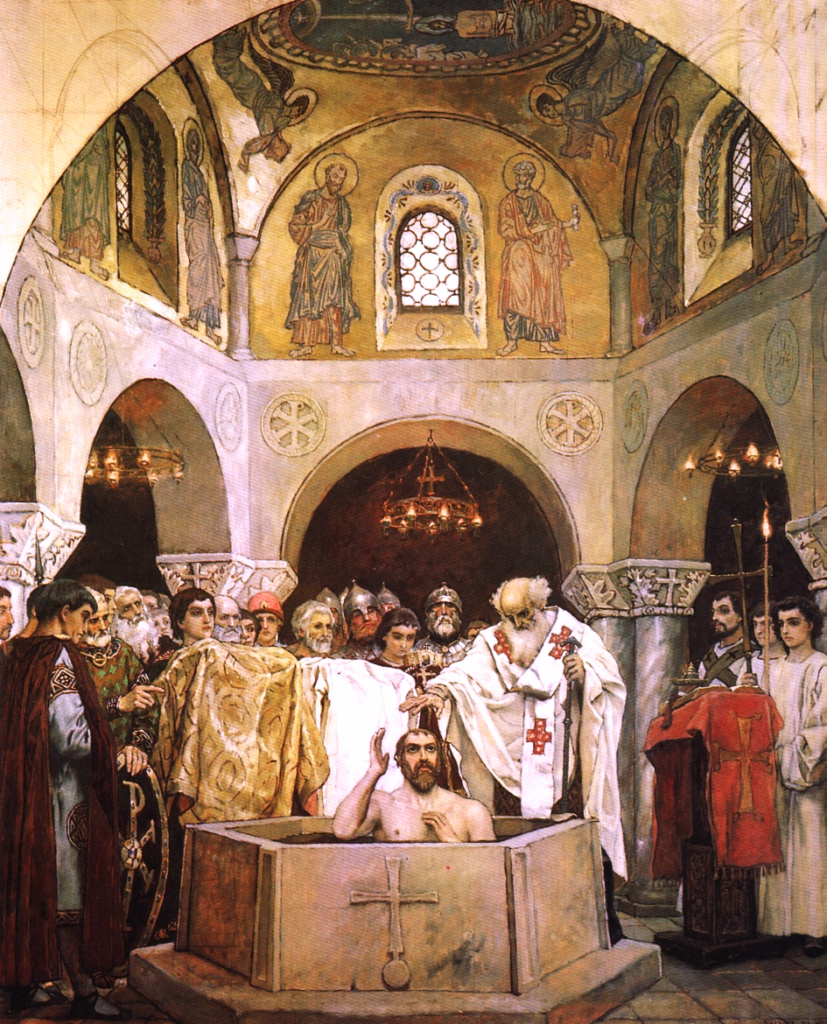Translation of the Holy Gospel According to Matthew
At that time Jesus was led by the spirit into the desert, to be tempted by the devil. And when he had fasted forty days and forty nights, afterwards he was hungry. And the tempter coming said to him: ‘If thou be the Son of God, command that these stones be made bread.’ Who answered and said: ‘It is written, Not in bread alone doth man live, but in every word that proceedeth from the mouth of God.’
Then the devil took him up into the holy city, and set him upon the pinnacle of the temple, And said to him: ‘If thou be the Son of God, cast thyself down, for it is written: That he hath given his angels charge over thee, and in their hands shall they bear thee up, lest perhaps thou dash thy foot against a stone.’ Jesus said to him: ‘It is written again: Thou shalt not tempt the Lord thy God.’
Again the devil took him up into a very high mountain, and shewed him all the kingdoms of the world, and the glory of them, And said to him: ‘All these will I give thee, if falling down thou wilt adore me.’ Then Jesus saith to him: ‘Begone, Satan: for it is written, The Lord thy God shalt thou adore, and him only shalt thou serve.’ Then the devil left him; and behold angels came and ministered to him.
A Message from Pope Benedict XVI’s Sermon for Ash Wednesday, 2009
St. Paul recognizes that everything in him is the work of divine grace but he does not forget that it is necessary to adhere freely to the gift of new life received in Baptism. In the text of chapter six of his Letter to the Romans, which will be proclaimed during the Easter Vigil, he writes: Let not sin therefore reign in your mortal bodies, to make you obey their passions. Do not yield your members to sin as instruments of wickedness, but yield yourselves to God as men who have been brought from death to life, and your members to God as instruments of righteousness (Rom 6:12-13). Contained in these words we find the entire program of Lent, in accordance with its intrinsic baptismal perspective. On one hand, they affirm the victory of Christ over sin, which happened once and for all with his death and Resurrection. On the other, we are urged not to yield our bodies to sin, that is, not to allow sin any room, so to speak, to take its revenge. The victory of Christ expects the disciple to make it his own and this happens first of all with Baptism, through which, united with Jesus, we became “living, returned from the dead”. The baptized person, however, in order that Christ may fully reign within him, must faithfully follow his teachings; he must never lower his gaze so as not to let the adversary gain ground in any way.
But how can the baptismal vocation be brought to fulfilment so as to be victorious in the struggle between the flesh and the spirit, between good and evil, a combat that marks our existence? ..the Lord indicates to us three useful means: prayer, almsgiving and fasting. We also find useful references to this in St. Paul’s experience and writings. Concerning prayer he urges us to be constant, and to be watchful in it with thanksgiving (Rom 12:12; Col 4:2), to pray constantly (1 Thes 5:17). Jesus is in the depths of our hearts. He makes himself present and his presence will remain, even if we speak and act in accordance with our professional duties. For this reason, in prayer there is within our hearts an inner presence of relationship with God, which gradually becomes also an explicit prayer. With regard to almsgiving the passages on the great collection for the poor brethren are certainly important (cfr. 2 Col 8-9) but it should be noted that for St Paul, love is the apex of the believer’s life, the bond of perfection; and above all these, he writes to the Colossians, put on love, which binds everything together in perfect harmony (Col 3:14). He does not speak specifically of fasting but urges people frequently to have moderation, as a characteristic of those who are called to live in watchful expectation of the Lord (cfr. 1 Thes 5:6-8; Titus 2:12). His reference to that spiritual competitiveness which calls for sobriety is also interesting: Every athlete, he writes to the Corinthians, exercises self-control in all things. They do it to receive a perishable wreath, but we an imperishable (1 Col 9:25). The Christian must be disciplined in order to discover the way and truly reach the Lord.
This, then, is the vocation of Christians: risen with Christ they have passed through death and their life is henceforth hidden with Christ in God (cfr. Col 3:1-2). To live this “new” existence in God it is indispensable to be nourished with the word of God. Only in this way can we truly be united with God and live in his presence if we are in dialogue with him. Jesus says so clearly when he responds to the first of the three temptations in the desert, citing Deuteronomy: Man shall not live by bread alone, but by every word that proceeds from the mouth of God (Mat 4:4; cfr. Dut 8:3). St. Paul advises: Let the word of Christ dwell in you richly, as you teach and admonish one another in all wisdom, and as you sing psalms and hymns and spiritual songs (Col 3:16). In this too, the Apostle is primarily a witness. His Letters are eloquent proof that he lived in constant dialogue with the word of God. His thought, action, prayer, theology, preaching and exhortation: everything in him was the fruit of the word, received in the Jewish faith from his youth and fully revealed to his eyes by his encounter with the dead and Risen Christ, which he preached for the rest of his life during his missionary “race”. It was revealed to St. Paul that in Jesus Christ God had pronounced his definitive Word, himself, a Word of salvation that coincided with the Paschal Mystery the gift of himself on the Cross which then became Resurrection, because love is stronger than death. Thus, St. Paul could conclude: Far be it from me to glory except in the Cross of our Lord Jesus Christ, by which the world has been crucified to me, and I to the world (Gal 6:14). In Paul the Word became life and his one boast is the Crucified and Risen Christ.



